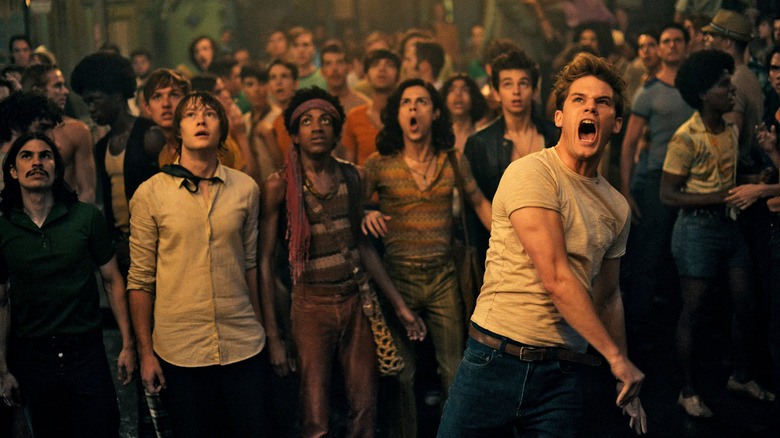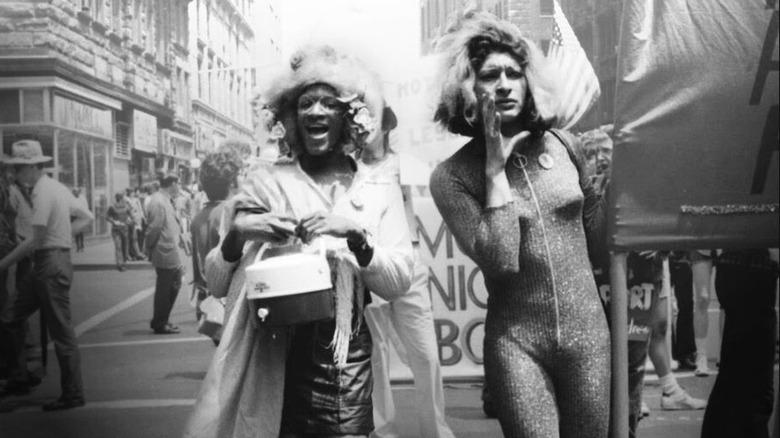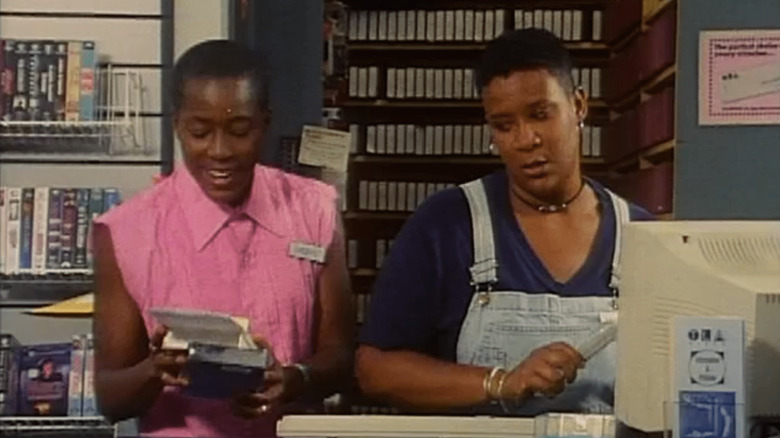Roland Emmerich's Worst Movie Isn't A Disaster Flick – It's Just A Disaster
Roland Emmerich is cinema's finest chaos goblin working today. His loudest detractors have accused him of being all spectacle and no substance, but I don't see anyone complaining on the Fourth of July when their fireworks displays don't have enough character development. Subtlety isn't Emmerich's strong suit, and I absolutely love him for it. Give me a spaceship with "F— the Moon" graffitied onto it in a movie called "Moonfall." Use the panic of the "2012" Mayan conspiracy theory to make a movie where a guy literally throws his annoying child to safety in a sacrificial effort. And yes, give me President Bill Pullman delivering an "Independence Day" speech so invigorating, so powerful, it brings about world peace. Emmerich is as much a filmmaker as he is the host of a cinematic demolition derby with a multi-million dollar VFX budget. That is to say, he is an artist of the highest order, and it's not his fault that some snobs can't understand the level on which he is operating.
Alas, there are no sacred cows in the world of filmmaking, and I'm willing to admit that even my Patron Saint of Pancaking Cities can (and will) miss the mark from time to time. However, Emmerich's disaster movies are not even in the same stratosphere compared to his worst film. Known for his science-fiction action hybrids, Emmerich has dabbled in more "serious" territory from time to time, including his Shakespearean history mystery "Anonymous" (of which I am a staunch defender), which borders on fan-fiction [complimentary], and his epic historical war drama "The Patriot," which, despite its historical inaccuracies, has been a de-facto "substitute history teacher lesson plans" in U.S. public schools for decades.
But he's also the guy who directed "Stonewall," quite possibly the worst piece of queer cinema ever made, boasting a whopping 9% on Rotten Tomatoes.
A hunky white boy did not throw the first brick at Stonewall
While the Stonewall Riots of 1969 were not the first time American LGBTQIA+ people fought back against government-supported persecution of the community (my kingdom for a quality movie about the 1966 Compton Cafeteria Riot), it was a turning point for the gay rights and liberation movement in not only the U.S. but also around the world. The uprising was in response to a planned raid of the Stonewall Inn, a Greenwich Village bar that was one of the few places that allowed LGBTQIA+ people to congregate freely and present authentically.
The gay, lesbian, queer, and trans patrons decided enough was enough and fought back against the police who showed up for no other reason than to arrest people for being gay and cross-dressing in public. It's commonly stated that the riot started when someone threw a brick at a cop, but the truth is a bit more complicated than that. If there's one thing to be sure of, however, it's that a hunky white boy did not throw the first brick at Stonewall.
As Mark Segal, who was actually there, wrote for PBS following the release of Emmerich's film, "'Stonewall' is uninterested in any history that doesn't revolve around its white, male, stereotypically attractive protagonist. It almost entirely leaves out the women who participated in the riots and helped create the Gay Liberation Front, which included youth, trans people, lesbian separatists, and people from all other parts of the spectrum of our community." This is not to shame Jeremy Irvine, who played Danny, the hunky white boy who Emmerich portrays as having thrown the first brick, but to question what in the hell Emmerich was thinking by completely whitewashing what really happened and who was responsible for fighting back against the cops.
Not to mention, the film also elected to have Marsha P. Johnson played by a cis male actor and failed to include legendary non-white activists who were pivotal in advancing queer rights, including Sylvia Rivera, Stormé DeLarverie, and Miss Major Griffen-Gracy. It's especially egregious when many of the people at Stonewall are still alive.
Better movies to watch during Pride Month
Recommending better movies to watch during Pride Month will differ by taste, and the landscape of queer cinema is as vast and diverse as the people who make up the LGBTQIA+ community. There could be individual lists for every LGBTQ subgenre in existence, but considering the historical context of "Stonewall," it feels appropriate to recommend films that are political, radical, and monumental in nature.
In the world of documentaries, the groundbreaking "Paris is Burning" (which is about the New York City underground ballroom scene) should be mandatory viewing along with 2011's "We Were Here," which is about the HIV/AIDS crisis in San Francisco. There's also 1968's "The Queen," which was thought to be lost for decades but was given a restoration just a few years ago. The memorable speech from Crystal LaBeija in the film was even sampled in the track "Ambience 001" on Frank Ocean's album "Endless." Then there's "Screaming Queens," a 2005 documentary about the Compton Cafeteria Riot (where trans women fought back against police three years before the events of Stonewall), and "The Death and Life of Marsha P. Johnson," a 2017 documentary about one of the most pivotal voices involved in Stonewall.
As for narrative features, the suggestions are truly innumerable. Just as a small sampling, I personally recommend "Young Soul Rebels," "The Boys in the Band," "The Watermelon Woman," "Serving Face," "Go Fish," "Tomboy," 1978's "Nighthawks," Jamie Babbit's "But I'm a Cheerleader," the filmographies of John Waters and Pedro Almodóvar, and every film I recommended to watch during Oscar season instead of "Emilia Pérez." No matter your taste, I can guarantee they all have a higher Rotten Tomatoes score than "Stonewall."


